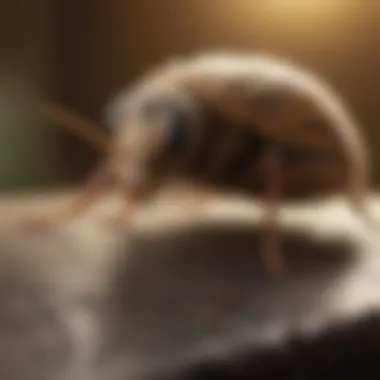Pest Control Solutions in Little Falls, NJ


Intro
Pest control remains a pertinent issue for homeowners in Little Falls, NJ. As many families are finding out, ignoring pest problems can lead to significant consequences. This article presents a detailed overview of the pest control landscape in this area, focusing on identifying common pests, exploring effective prevention methods, recommending DIY solutions, and emphasizing sustainable practices. The intent is to provide practical advice tailored for residents looking to maintain their homes pest-free.
Pest Identification
Identifying pests accurately is a crucial first step in effective pest management. Knowing what types of pests are common in Little Falls and recognizing their signs of infestation can save residents time and money.
Common Household Pests
Some common household pests that residents may encounter in Little Falls include:
- Ants: Carpenter ants and sugar ants are prevalent. They often invade homes in search of food.
- Termites: Known to cause extensive damage, especially to wooden structures.
- Rodents: Mice and rats can invade homes, particularly during colder months.
- Bed Bugs: These pests are increasingly found in homes and can cause discomfort.
- Cockroaches: Common in urban areas, these insects can be tough to eradicate.
Signs of Infestation
Recognizing the early signs of an infestation is vital. Some indicators include:
- Droppings found near food sources or nesting areas.
- Damage to wood, which may indicate termite activity.
- Unusual trails or paths where ants or other insects travel.
- Strange odors or musty smells, which might suggest a larger rodent problem.
"Timely identification is key for controlling pest problems before they escalate."
Prevention Methods
Preventing pests from invading your home is often more effective than dealing with them after they arrive. Several strategies can be used by homeowners in Little Falls.
Environmental Modifications
Making changes to the environment inside and outside your home can deter pests. For instance:
- Seal Entry Points: Use caulk to seal gaps around windows, doors, and where utilities enter the home.
- Proper Drainage: Ensure gutters are clean and direct water away from the foundation.
- Landscaping Considerations: Keep bushes and trees trimmed and maintain a clear distance between plants and the structure.
Home Maintenance Tips
Regular home maintenance can significantly reduce pest issues.
- Check for leaks in plumbing and fix them promptly.
- Store food in airtight containers to avoid attracting pests.
- Dispose of trash frequently and keep garbage containers sealed tight.
DIY Pest Control Solutions
For some residents, DIY pest control can be a convenient and cost-effective approach. Various solutions can be applied without needing professional help.
Natural Remedies
Many natural remedies may assist in pest control, including:
- Diatomaceous Earth: A natural powder that can kill insects by dehydrating them.
- Essential Oils: Oils like peppermint or tea tree can repel pests when diluted and sprayed around entry points.
DIY Traps and Barriers
Creating your own traps can also be effective. Methods include:
- Homemade Bait Traps: Use vinegar and baking soda for ant traps.
- Physical Barriers: Use screens on windows and doors to prevent insects from entering the house.
Interventions like these promote proactive pest management, empowering homeowners to take control of their environments.
Prologue to Pest Control
Pest control is an essential aspect of maintaining a healthy living environment. Homeowners often overlook its significance until faced with an infestation that disrupts their daily life. Addressing pest issues not only ensures comfort but also protects property values and public health. Effective pest management combines understanding, prevention, and remediation to keep homes safe.
Importance of Pest Control
Pests can cause various problems, ranging from property damage to health risks. Rodents and insects can compromise the integrity of structures, chew through wiring, and contaminate food. Diseases such as Lyme disease and West Nile virus can spread through pests, making control critical. Here are a few reasons why pest control must be a priority:
- Health Concerns: Many pests carry diseases that can jeopardize the health of you and your family.
- Financial Implications: Infestations can lead to costly repairs, increased insurance premiums, and lower property value.
- Peace of Mind: Knowing your home is protected from pests allows you to relax and fully enjoy your space.
Overview of Pest Issues in Little Falls, NJ


Little Falls, NJ, is home to a variety of pests that residents need to be aware of. The climate and environment create ideal conditions for certain pests to thrive. Common issues include:
- Rodents: The presence of food and shelter leads to significant rodent activity.
- Termites: These insects are a serious threat to wooden structures and require timely intervention.
- Ants: Various species invade homes in search of food, causing disturbances.
- Spiders: While some species are harmless, others can pose health risks.
- Bed Bugs: These pests have made a resurgence, often hitching rides on luggage or furniture.
Understanding these issues is the first step toward effective pest control. Awareness of what to look for and addressing potential vulnerabilities is crucial for residents in Little Falls.
Common Pests in Little Falls
Addressing common pests is vital for homeowners. It directly affects living conditions, health, and property value. Little Falls, NJ, is no exception. Understanding local pest issues can help residents effectively manage them and reduce potential damage.
Rodents
Rodents include mice and rats, which often invade homes seeking food and shelter. Their presence poses a significant health risk. They can spread diseases like hantavirus and leptospirosis. Additionally, rodents can cause structural damage by gnawing on walls and wiring. It is essential to seal entry points and maintain cleanliness to prevent their infestation.
Signs of a rodent issue include droppings, gnaw marks, and nesting materials. Being aware of these indicators can prompt quick action, minimizing any long-term issues. Traps and baits are common solutions, but prevention is crucial for keeping them at bay.
Termites
Termites are often considered the most damaging pests to wooden structures. In Little Falls, their presence can significantly threaten wooden homes. They feed on cellulose, primarily found in wood. This feeding can weaken the integrity of a house over time. Therefore, regular inspections are necessary.
Common signs of termites include mud tubes, discarded wings, and hollow-sounding wood. Homeowners should seek professional inspections to detect these pests before they cause extensive damage. The use of baiting systems and liquid treatments can effectively control their population.
Ants
Ants are prevalent in many households. While some may be harmless, others, such as carpenter ants, can cause damage. Little Falls residents must identify the type of ant. This is important for ensuring proper management strategies. Ants usually follow scent trails to food sources, making cleanliness crucial in prevention.
Signs of infestation include visible ants and small piles of shavings or debris. Homeowners can employ various methods such as bait stations or natural repellents to deter them. Consistent monitoring of entry points is beneficial to manage their recurrence.
Spiders
Spiders can be both beneficial and bothersome. While many spiders are harmless and help control insect populations, some can pose risks. Black widows and brown recluse spiders are examples of venomous types present in New Jersey.
Signs of spider infestation include webs and spots where they commonly reside. Keeping homes clutter-free is essential, as spiders prefer dark, undisturbed areas. Regular cleaning can deter them, minimizing the chances of encounters with harmful species.
Bed Bugs
Bed bugs have emerged as a widespread issue, particularly in urban areas. These pests can invade homes unnoticed, often hitching rides on luggage or clothing. Their bites can lead to discomfort and allergic reactions in some individuals.
Signs of bed bug infestation include small blood stains on bedsheets, itchy bites, and the presence of shed skins. Controlling bed bugs often requires professional pest treatments, as they can be difficult to eliminate. Preventative measures, such as inspecting second-hand furniture and regularly washing bedding, can help reduce risks.
"Awareness and early detection of these common pests in Little Falls can safeguard your home and well-being.”
In summary, understanding the common pests in Little Falls equips homeowners with necessary tools to manage their presence effectively. From rodents to bed bugs, being informed can prevent greater issues down the line.
Identification and Prevention
Effective pest control begins with identification and prevention. Understanding the types of pests that can invade your home allows for targeted action. Early identification can save time and reduce costs associated with infestations. Preventative measures are equally crucial as they can thwart future pest issues. Homeowners should be aware that a proactive approach can greatly minimize risks.
Identifying Pests
Identifying pests is the first step in managing them. Different pests require different methods of control. For instance, rodents can often be identified by droppings, gnaw marks, or nests. Termites may leave behind mud tubes or damage to wood structures. Observing your environment for signs of these pests can help in early detection. It's also important to remember that some pests may be more seasonal. During warmer months, ants and spiders may proliferate, while winter might see more rodents seeking shelter indoors.
Signs of Infestation
Being vigilant about signs of infestation is vital. Common indicators include:
- Unexplained damage to furniture or structures.
- Visible pests in living areas.
- Sounds, such as scratching or scurrying, especially at night.
- Unusual droppings or trails left by pests.
Any of these signs should prompt immediate investigation. Ignoring early signs can lead to significant damage and may complicate removal efforts.
Preventative Measures
Taking preventative measures can significantly decrease the likelihood of pest infestations. Here are some methods to consider:
- Seal entrances: Check for gaps around windows, doors, and pipes. Sealing these can prevent pests from entering.
- Maintain cleanliness: Regular cleaning can eliminate food sources and nesting areas. Ensure that leftovers are stored properly and trash bins are sealed.
- Landscaping: Keep plants away from the foundation and trim overgrown shrubs. This reduces potential hiding spots for pests.
- Regular inspections: Schedule routine checks of your home for any signs of pests. Early detection can lead to easier resolutions.
Investing time in identification and prevention lays a strong foundation for pest management. Without these steps, pest problems can escalate quickly, posing risks to health and property.
DIY Pest Control Solutions


The realm of pest control has seen a rise in the DIY approach, especially in Little Falls, NJ. Homeowners now seek knowledge and tools to manage their pest problems effectively. This section highlights the significance of DIY pest control solutions, underscoring their practicality, cost-effectiveness, and empowerment of homeowners.
Natural Remedies
Natural remedies serve as eco-friendly alternatives among various DIY pest control solutions. Many common pests have vulnerabilities that can be exploited without harsh chemicals. For instance, a mixture of vinegar and water can deter ants, while essential oils like peppermint can repel spiders. Baking soda, when combined with sugar, can be an effective way to lure and kill cockroaches.
- Safety: Natural remedies tend to be less harmful to humans and pets compared to synthetic chemicals.
- Accessibility: Most ingredients are readily available in most households.
- Minimal Environmental Impact: Using natural products reduces pollution and minimizes ecological footprint.
However, effectiveness may vary, and it’s crucial to identify which remedy suits the specific pest issue.
Commercial Products
There is a wide array of commercial products available for DIY pest control. These products include insecticides, traps, and baits designed for particular pests. For example, traps for rodents or specialized sprays for insects like termites can be effective yet must be used with caution. Always read labels and instructions to ensure proper usage.
- Effectiveness: Many commercial products are thoroughly tested, ensuring measurable results.
- Time Efficiency: These products often provide immediate solutions, saving time compared to longer-term natural remedies.
- Variety: The market offers options tailored for various pests, enabling targeted approaches.
While commercial products can be effective, some contain chemicals that may present risks. Taking appropriate precautions, such asking the relevant environmental agencies, is crucial for safe application.
Effective Techniques
Utilizing effective techniques is essential for the success of DIY pest control. Knowledge about pest behavior can enhance strategies employed by homeowners. Here are some widely used and successful techniques:
- Sealing Entry Points: Inspecting and sealing cracks or openings in the house can prevent pests from entering.
- Regular Cleaning: Maintaining cleanliness in and around the home reduces the likelihood of attracting pests. Food residue and clutter can be significant attractants.
- Exclusion Methods: Utilizing screens and barriers can protect against entry from outdoor pests.
- Trapping: Using traps can be effective not just for rodents, but also for insects, particularly in monitoring infestations.
"Understanding the behavior of pests allows for proactive measures, significantly reducing the need for reactive control strategies."
By applying these techniques, homeowners in Little Falls can take control of their pest problems while reducing reliance on professional services. However, recognition of the limits of DIY approaches is also important. If infestations are severe or persisting, seeking help from professional pest control services should not be dismissed.
Professional Pest Control Services
Professional pest control services offer vital assistance for managing pest issues in Little Falls, NJ. These services go beyond simple extermination; they encompass comprehensive strategies tailored to eliminate and prevent pest infestations while ensuring the safety and health of the home environment. Homeowners who struggle to deal with persistent pest problems often realize the value of expert intervention.
When to Call a Professional
There are several situations when a call to a pest control expert becomes necessary. If you notice increasing signs of infestation, such as droppings, gnaw marks, or nests, it is time to take action. Crucial moments include:
- Visible signs of pests: If pests are actively seen in living spaces, hiring professionals is recommended for quick resolution.
- Severe infestations: When the infestation is beyond control through DIY methods, specialists have the necessary training and equipment.
- Health concerns: Should there be worries about diseases transmitted by pests, such as rodents or mosquitoes, seeking professional help is essential.
- Structural damage: If your home shows signs of damage, particularly from termites or rodents, a professional assessment is critical.
Choosing a Pest Control Company
Selecting the right pest control company is a decision that requires careful consideration. Factors to keep in mind include:
- License and certification: Ensure the company is properly licensed and follows New Jersey regulations.
- Experience: Opt for a business with a strong history in pest control, especially dealing with local pest challenges.
- Methods and products used: Assess their techniques, whether they employ eco-friendly alternatives or traditional methods, to ensure they align with your values.
- Reputation: Research reviews, testimonials, and any complaints to gauge their reliability and effectiveness.
It is advisable to obtain multiple quotes before making a choice. This provides a broader view of services and pricing, enabling comparison and informed decision-making.
What to Expect from Professional Services
When you hire a pest control service, several steps are typically involved:
- Initial Inspection: The company will inspect your property thoroughly to determine the extent of the infestation and identify the types of pests.
- Treatment Plan: Based on the inspection findings, a tailored treatment plan will be presented, detailing methods and timelines.
- Implementation: Technicians will carry out the required treatments using professional-grade products, ensuring efficiency and effectiveness.
- Follow-Up: After treatment, many companies will conduct follow-up visits to ensure the pests are eradicated and to check for new signs of activity.
Professional pest control services not only handle current infestations but also educate homeowners on preventive strategies.
Understanding the pest dynamics in Little Falls and knowing when and how to engage professional services can significantly improve your home environment and peace of mind.
Legal Considerations in Pest Control
Legal considerations in pest control are paramount for ensuring that management practices comply with local and state laws. The significance of understanding these regulations cannot be understated, particularly for homeowners and pest control professionals. Engaging with pest control without this knowledge could result in fines, liability issues, or even health risks to the communities involved.
Regulations in New Jersey
In New Jersey, pest control is regulated under various statutes aimed at protecting public health and safety. The Department of Environmental Protection oversees pesticide application, necessitating adherence to specific regulations. Key points include:
- Licenses: Pest control operators are required to obtain licenses to ensure they are qualified to use specific chemicals.
- Recording and Reporting: Companies must maintain detailed records of all pesticides used, including dates, locations, and amounts applied.
- Consumer Protection: Certain regulations are in place to protect consumers from misuse of chemicals, mandating proper labeling and providing safety instructions.
Failure to abide by these rules can lead to legal repercussions, including suspension of licenses or significant fines. Thus, knowing the laws in New Jersey is critical for any pest management effort.


Chemical Use and Safety Guidelines
The use of chemicals in pest control is subject to strict guidelines designed to mitigate risks to human health and the environment. Homeowners need to be informed about these safety protocols to ensure their usage aligns with state laws. Importance of handling chemicals properly includes:
- Read Labels: Before applying any pesticide, thoroughly read the product's label for guidance on safe application.
- Protective Gear: Wearing appropriate safety gear like gloves and masks is essential to prevent direct exposure.
- Storage: Chemicals should be stored in a safe environment, away from children and pets, following manufacturer recommendations.
"Ensuring compliance with safety guidelines protects not only individuals but also the community as a whole."
Adhering to legal standards and safety regulations fosters a responsible approach to pest control, ensuring the well-being of all residents in Little Falls.
Sustainable Pest Management Practices
Sustainable pest management practices are essential in addressing pest control issues while minimizing harm to the environment. As residents of Little Falls, NJ, become more aware of ecological impacts, these methods gain both relevance and importance. This section delves into eco-friendly solutions and strategies for integrating sustainability into pest control efforts.
Eco-Friendly Solutions
When dealing with pests, eco-friendly solutions should be prioritized. These solutions tend to have a lower impact on both human health and the environment. Some noteworthy options include:
- Diatomaceous Earth: A natural powder that can eliminate crawling insects. It is safe for pets and children, making it an ideal option for households.
- Essential Oils: Oils like peppermint and tea tree can repel various pests. They provide a non-toxic alternative for homeowners.
- Neem Oil: Derived from the seeds of the neem tree, this oil disrupts the life cycle of insects and is effective against many common pests.
- Insecticidal Soap: Made from natural oils and fats, this organic option can safely eliminate soft-bodied insects on plants.
Incorporating these remedies demonstrates a commitment to sustainable practices while effectively managing pest populations.
Integrating Sustainability into Pest Control
Integrating sustainability into pest control practices involves a multifaceted approach. Here are some strategies homeowners can consider:
- Use of Organic Methods: Employ organic pest control methods as the first line of defense. This reduces reliance on chemical pesticides.
- Habitat Modification: Altering an environment can deter pests. Keeping areas clean, managing waste properly, and eliminating standing water can minimize pest attraction.
- Biological Control: Utilize natural pest predators. For instance, introducing ladybugs can help control aphid populations.
- Regular Monitoring: Regularly inspect areas where pests may thrive. Early detection can prevent infestations and limit pest damage.
Adopting these practices ensures that pest control is not just effective but also provides benefits to the ecosystem.
Sustainability in pest management is not merely a trend; it has become a necessity for homeowners aiming for a healthier living environment.
By prioritizing sustainable solutions, residents of Little Falls can manage pests effectively while protecting the community and environment.
The End
In closing, effective pest control is crucial for maintaining a healthy environment in Little Falls, NJ. The various insights shared throughout this article are essential for homeowners wishing to protect their living spaces from the disruptions caused by pests.
Summary of Key Points
- Pest control is vital in protecting homes and ensuring the safety of residents.
- Common pests such as rodents, termites, ants, spiders, and bed bugs have specific challenges related to identification and treatment.
- Preventative measures are the first line of defense against pest issues. Homeowners should consider natural remedies or commercial products for DIY control before resorting to professional assistance.
- When faced with extensive infestations, seeking professional services is advisable. It is important to choose reputable companies that comply with New Jersey regulations.
- Legal considerations are significant. Residents must understand chemical use and safety guidelines to protect their families and the environment.
- Sustainable practices are becoming more popular. Eco-friendly solutions help align pest control with environmental preservation, a necessary consideration for any responsible homeowner.
Future Trends in Pest Control
Looking ahead, pest control strategies will likely evolve due to technological advancement and growing awareness of sustainability. Here are some anticipated trends:
- Smart Technology: Innovations like electronic traps and monitoring systems will likely gain traction. These technologies can streamline pest detection and intervention processes.
- Sustainable Solutions: Continued emphasis on eco-friendly methods will shape the industry. Products that minimize chemical usage without sacrificing effectiveness will be increasingly sought after.
- Public Awareness: As education about pest issues increases, more homeowners may take proactive measures, reducing the need for reactive treatments.
- Integration of Services: Businesses may offer combined services for pest control and landscaping, recognizing the interplay between these areas in maintaining pest-free environments.
As these trends emerge, the landscape of pest control in Little Falls, NJ, will undoubtedly shift. Homeowners, therefore, must stay informed to adapt strategies effectively and sustainably.
"Proactive measures in pest control not only deter infestations but enhance the quality of living for all residents."
By engaging with these insights, residents can better manage pest challenges, securing their homes for the long term.
Local Pest Control Associations
Local pest control associations play a vital role in the community. These organizations are dedicated to education, resources, and support for pest management professionals and homeowners. One of the benefits of being involved with these associations is the access to industry standards and best practices. These standards ensure that pest control techniques are effective and environmentally responsible.
In Little Falls, associations often provide:
- Networking Opportunities: Connect with professionals in the industry and learn from their experiences.
- Educational Programs: Attend workshops or seminars focusing on the latest pest control techniques and products.
- Current Regulations: Get updates on local pest control regulations which vary regionally.
Engagement with local associations fosters a better understanding of pest control needs, and can even lead to recommendations for trusted pest control companies.
Online Guides and Articles
The Internet offers a treasure trove of information on pest control. Online guides and articles can serve as quick references for identifying pest types, understanding their behavior, and implementing control methods. Resources such as pest control blogs, forums, and government websites offer practical advice tailored to homeowners.
Some advantages of using online resources include:
- Diverse Perspectives: Articles provide insights from multiple authors, contributing to a broader understanding.
- Real-Time Updates: Online content is frequently updated to reflect changes in regulations, pest behavior, and control technologies.
- Community Support: Forums, such as those on Reddit, allow users to share personal experiences and ask questions in real time.
For comprehensive pest management advice, consider resources like Wikipedia and Britannica for well-researched articles. Additionally, visiting online communities like Facebook can provide a platform for connecting with local pest control experts and other homeowners facing similar issues.
By utilizing these additional resources, homeowners can empower themselves to manage pests effectively and make informed decisions about pest control options.















